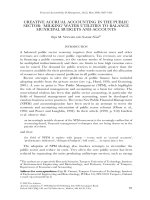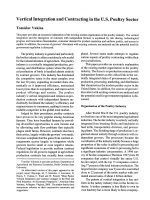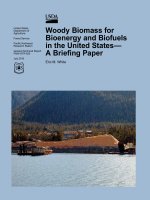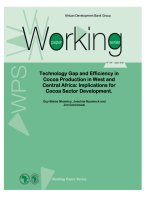Technology status and perspectives in the bioenergy sector ppsx
Bạn đang xem bản rút gọn của tài liệu. Xem và tải ngay bản đầy đủ của tài liệu tại đây (2.18 MB, 18 trang )
1
Energy
placeholder
partner logo
Technology status and perspectives
in the bioenergy sector
Biogas from Energy Crop and waste in Germany
www.german-renewable-energy.com
placeholder
partner logo
Biogas from Energy Crop und waste in Germany
Overview
Feedstock & Market Perspectives
Technology option I: Energy Crop
Technology option II: Co-Fermentation
Economics: feasibility, yields, costs & benefits
2
placeholder
partner logo
Biogas in Germany
Overview
placeholder
partner logo
Overview in Europe
3
placeholder
partner logo
Biogas Plants in Germany
placeholder
partner logo
History and Status Quo “Biogas in Germany”
2005 2006 2007 2008 2009
Number of installed plants
2600 3500 3710 3900 4600
Electrical installed capacity (MWel)
650 1100 1270 1370 1740
Electricity (TWh/a)
2.8 >5 7.4 10.3
Contribution to overall electricity production
0.5% >1% 1.4% 1.6%
Manufacturers income generation (Billion EUR)
0.5 1 0.65 0.6 1.05
Operators income generation (Mio EUR)
360 650 750
Participation in exporting sector
8% 12% >15%
Employments
5,000 10,000 10,000 8,500 10,500
CO2 Reduction (Mio t/a)
2.5 5 6.4
4
placeholder
partner logo
Increase of the number of biogas plants related to
changes in laws and regulations
placeholder
partner logo
Biogas Market Development in Germany
5
placeholder
partner logo
Reasons for Market Development
High standards on technical development
Different standardized types of digesters and plant
technologies
Consolidation of Dry Fermentation Technology
Automatisation of system control and operation
Enabling environment & economic incentives
Fixed Feed in Tarrifs guaranteed for 20 years,
Energy Crop Bonus
Regulated grid access at reasonable cost
placeholder
partner logo
Market Development
Over 1.000 enterprises working in the sector
About 4.600 biogas plants operating
Technologies for upgrading to biomethane (23
projects) and biogas as transport fuel (2 projects)
Technologies for efficient use of thermal energy
Advanced technologies for sludge treatment
and its application as fertilizer
6
placeholder
partner logo
Biogas from Energy Crops in Germany
Feedstock &
Market Perspectives
placeholder
partner logo
Different efficient ways to produce energy from biomass
Source: Institute for Energy and Environment, Leipzig, 2007: Kosten und Ökobilanzen von Biokraftstoffen
7
placeholder
partner logo
placeholder
partner logo
Feedstock for Biogas Production in Germany
Agricultural Subproducts
15,4%
Animal waste
23,9%
-
1,7%
Sewage sludge
3,8%
Landfills
5,1%
Organic household
waste
2,3%
Energy crops
46,2%
landscaping
1,6%
In total: 24 Bln m³ Biogas: 50 Mio. MWh electricity and 72 Mio. MWh heat
Organic
industrial waste
8
placeholder
partner logo
Status Quo: feedstock
Tendencies since
2005 :
Strong increase in the use
of energy crops (> 26%, on
500,000 ha)
Corn at first place (> 80%
of the land that is used for
biogas crops)
Optimized pre-treatment of
substrates in order to
improve biogas production .
placeholder
partner logo
Biogas Market perspectives for Biomethane
Biomethane is like natural gas - but produced locally
like natural gas - but with guaranteed supply
Potential:
- 10 Billion m³ produced on 10% of agricultural land (with an
energetic yield of 62.000 kWh/ha)
- options to improve up to : 100.000 kWh/ha
- 16 Billion m³ biomethane (corresponding to 50% of the gas
imports from Russia)
- Up to 17% of the consumed electricity
- Up to 20% of the consumed natural gas
- Up to 35% of the consumed transport fuel
Energy crops present most of the potential.
Promissing results with crops cultivated especially for biogas
production
9
placeholder
partner logo
Sector Perspectives in the future
Since April 2008 GasNet Feed in Ordinance GasNZVO, Gas Feed
in Law in discussion GEG
From January 2009 on, new regulations for feed-in-grid EEG of
biogas: more incentives for agricultural biogas plants and for the
treatment of waste
Until 2020 the number of 12.000 biogas plants can be reached with
an installed capacity of 4.800 MWel. from agricultural resources
Until 2020 all renewable energies could produce 30% of all
electricity, therefore one quarter of this could come from biogas
plants
Governmental goal: until 2030 at least 10% of biogas contained in
the natural gas grid (equals 6.000.000.000 m³ Biomethane per year)
placeholder
partner logo
Biogas from Energy Crop in Germany
Technology option I:
Energy Crop
(Shining Examples)
10
placeholder
partner logo
Shining example I: Biogas Plant Thomas Karle - Kupferzell
General Information
In operation since 2001
Added new plant in 2004
Gas turbine and sludge drying system (2007)
Agricultural area: aprox. 100 ha
Substrates
Liquid manure (cattle)
Corn sillage
Oat sillage
Harvest and production waste (DM~15%)
Technical description
Digester : 1 x 600 m³
Digester (new plant) : 1 x 1600 m³
Storage tank (covered with double memb.)
Feed-in system for substrate: 45 m³
CHP: 1 x MDE gas motor 320 kWel
2 x Microgas turbines in summery 130 kWel
Heat surplus production: “electrical pig”
using greenhouse system for electrical drying of
digestate
placeholder
partner logo
Shining example II: Biogas Plant Geveke - Westerstede
Substrates
Green sillage: 27 t/d
Corn sillage: 4.7 t/d
Cattle manure: 2 m³/d
Agricultural land: 75 ha (greenland)
+ 7 ha (corn)
Production data
CH4 content: 53 %
CHP: CES – MAN gas motor
Installed electrical capacity: 500kW
Technical Description
Volume digester: 2 x 1,000 m³
Post-digester : 1.000 m³
Temperature of operation: 48 °C
Sludge storage: 3.600 m³
Optimización de Prod. gas
11
placeholder
partner logo
Shining example III: Dry Fermentation Plant Biomassehof Langenau
Substrates
Landscaping: 4.000 t/a
Corn sillage: 8.000 t/a
Green and Grain Sillage: 2.000 t/a
Cultivated land: 150-200 ha energy crops
Production data
Electricity input for operation: aprox. 5%
CHP: (3) MAN 180 kWel. c/u
Electricity production: 4,050 MWh/a (7.500
hours operation in summery per year)
Use of surplus heat: Wood drying, District
heating (planned)
Technical Description
Garage Digester: 7 x 500 m³
Percolation Tank: 320 m³
Gas container (2 hours full CHP): 600 m³
Sludge storage: 3.600 m³
Dry fermentation plant (batch method)
Investment Costs: 1.9 Mio. Euros
placeholder
partner logo
Dry Fermentation of stackable Biomass [DS > 25%]
„garage type“ digester
(BEKON, 2005)
12
placeholder
partner logo
Biogas from waste in Germany
Technology option II:
Cofermentation
(Basics)
placeholder
partner logo
Cofermentation (schedule)
(BEKON, 2005)
13
placeholder
partner logo
Cofermentation (facts)
Higher technological standard => high investment costs
Higher approval conditions => higher costs
Examination and testing costs
No agricultural subsidies
Income of gate fees and energy sales
Restricted spreading possibilities
placeholder
partner logo
Biogas from Energy Crops and waste in Germany
Economics:
feasibility, yields,
costs & benefits
14
placeholder
partner logo
Gas yields from different substrates
Cow manure, liquid (9% DM)
Pig manure, liquid (7% DM)
Chicken manure (15%DM)
Turkey manure (20% DM)
Vegetable residues (10% DM)
Grass silage (25% DM)
Corn silage (30% DM)
Left over food (20% DM)
Cereal straw (85 % DM)
Grease separator (5 / 50 % DM)
Colza cake (15% fat)
Left over bread (90 % DM)
Wheat whole grain (85% DM)
spec. gas
yield
m³ / t
substrate
placeholder
partner logo
Industrial waste / Agricultural residues
15
placeholder
partner logo
Investment costs of a biogas plant
placeholder
partner logo
German Feed in Tariff for Electricity from Biogas
in € cent/kWh; fixed for 20 years (fractional with degression)
EEG 2000 EEG 2004 EEG 2009
Basic Compensation up to 150 KW 10,23 ct 11,5 ct 11,67 ct
150 – 500 KW 10,23 ct 9,9 ct 9,18 ct
over 500 KW 10,23 ct 8,9 ct 8,25 ct
Energy Crop - Bonus - 6 ct 7 ct
Manure-Bonus (> 30%) to 150 KW - - 4 ct
150 – 500 KW - - 1 ct
Technology Bonus - 2 ct 1 o. 2 ct
Landscape Maintenance Grass Bonus
(> 50%)
- - 2 ct
Formaldehyd Emission Limit Bonus
(only BimSch-Anl. > 500 KW)
- - 1 ct
Heat Utilisation-Bonus - 2 ct 3 ct
Degression 1%
1,5%
(only Basic C.)
1%
(also Boni)
16
placeholder
partner logo
Components of a biogas plant with CHP unit
Feststoffeintrag
Kondensat-
abscheider
Rührkessel-
reaktor
Endlager
Vorgrube
Heizöltanks
Nah- (Fern-) Wärmenetz
Pufferspeicher
Spitzenlast-Kessel
Heat buffer storage
Peak heat supply
District heating
Mixing pit
Solid feeder
End storage
Mixed
reactor
placeholder
partner logo
Example Biogas Upgrading and CHP
Energy
Crops
Org.
Residues
Biogas
Bio-
methane
Gas
transport
EEG-
Electricity
Heat
El
Grid
Customer
Biogas
Upgrading
Biogas
Plant
Gas GridCHP
CO2
17
placeholder
partner logo
The EU-Project GasHighWay
Worldwide over 10 million (is equivalent 1% of
all registered vehicels of the world) gas driven
vehicles are operating mainly on CNG,
whereas the use of biomethane as vehicle fuel
is still relatively new in many countries.
placeholder
partner logo
Status Quo in Europe before “GasHighWay Kick off”
EU has set the target of increasing the share of biofuels and so-
called alternative fuels (including natural gas) in traffic to 20 % by
2020.
Among the countries participating in the project, Italy, Germany
and Sweden are most advanced in terms of number of gas
vehicles and gas filling stations.
In Finland, Latvia, Czech Republic and Austria the use of these
fuels is in the beginning stage.
In Estonia, Lithuania and Poland these markets are virtually non-
existent today.
For biomethane and CNG as a transport fuel there are
unfavourable and/or inadequate policies, standards and regulation
in place in most European countries.
18
placeholder
partner logo
Closed loop economy
„Alles, was gegen die Natur ist, hat auf
die Dauer keinen Bestand.“
(Charles Darwin)
placeholder
partner logo
THANKS
for your attention!
www.biogas-zentrum.de
www.gerbio.org









